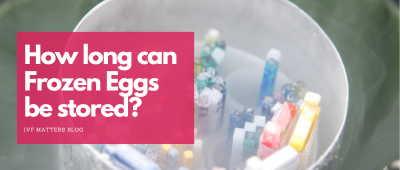If you love the idea of having a family someday but aren’t quite ready for one right now, egg freezing could be the perfect way to preserve your fertility.
Put simply, egg freezing empowers women to take back control of their fertility. It allows you to decide when you want to start a family, while also protecting you should anything harm your fertility in the future.
Since the first baby born using frozen eggs back in 1986, and the huge advancements in egg freezing medical technology and processes, egg freezing has boomed in popularity, showing a 39% increase from pre-pandemic levels in egg retrieval procedures in the US alone.
But what exactly does the egg freezing process involve? And is it actually effective?
Join us as we answer both of these questions, highlighting some of the key data and success rate statistics you’ll need to consider before choosing to go ahead with it.
What does egg freezing involve?
Before we look at the effectiveness of egg freezing, it’s important to consider what’s actually involved during the process.
Should you decide to go ahead and start your egg freezing journey, the first step of the process will be attending a consultation with a fertility specialist, such as IVF Matters, Dr Irfana Koita, who will assess your general and reproductive health using various tests.

From this, your consultant will then know whether you are a suitable candidate for egg freezing or not, and they will let you know whether you can move ahead with the process.
If you are given the go-ahead to proceed for treatment, you will then be given fertility medications to boost the number of eggs you produce during a process known as ovarian stimulation.
Once you have taken the medication for approximately 14 days, you will then be called in for a follow-up appointment with your fertility specialist, where the eggs will be retrieved before undergoing vitrification — a process designed to rapidly freeze your eggs without forming potentially harmful ice crystals.
Then, while you’re recovering from the procedure, your eggs will be transferred to a secure storage facility, where they will be stored safely until you decide that you’re ready to start a family.
What can impact egg freezing success rates?
A wide range of factors can not only impact your ability to freeze your eggs in the first place but also your likelihood of becoming pregnant when you choose to use them.
Certain lifestyle choices, for example, can impact success rates.
Before any treatment, note that being overweight, having a poor diet, smoking, drinking too much alcohol and leading an inactive lifestyle, could all hinder your chances of having a baby and affect the quality of the eggs that you are able to produce. Similarly, you must focus on optimising your fertility health in order for your body to more readily accept implantation when it is time to proceed to start your family.
Likewise, medical conditions that impact the number and quality of the eggs you produce, such as having a diminished ovarian reserve, can also make the retrieval process more difficult and reduce the likelihood of eggs surviving the thawing process.
Egg freezing and ageing
However, age is the key determining factor that influences egg freezing success rates.

Generally speaking, the older you are, the lower the quality of your eggs are likely to be, and the less viable they could be when used for fertility treatments like in vitro fertilisation (IVF). Therefore, if you are aged somewhere between your 20s and early 30s, this is generally considered the best time to freeze your eggs.
A recent study has shown that women under 35 who freeze at least 10 eggs can have a success rate of upwards of 60% — and if 20 eggs were frozen, this jumped to 80%. This percentage then plummets when you reach your mid-30s, with only 30% of women aged over 35 becoming successful when storing 10 eggs.
From this point onwards, success rates continue to decline into your 40s where any eggs you decide to freeze, will be much lower quality and less abundant than they were when you were in your 20s.
This effectively means that if you’re planning on starting your family much later on in life, freezing your eggs at an earlier age (ideally between your 20s and mid-30s) will give you a higher chance of success.
To find out more about success rates and what they mean, our success stories page has all the information you need.
So, is freezing your eggs worth it?
Deciding whether to freeze your eggs or not really depends on your individual circumstances, but it can offer a number of important benefits.
For healthy, active women in their mid-20s that want to prioritise other personal ambitions before having a baby, egg freezing can be an empowering move that gives them ownership of their future fertility.
Knowing your likelihood of success is also a key aspect to consider when making your decision to undergo treatment. So, to find this out, consult a reputable fertility clinic like IVF Matters, to set up a personalised assessment and talk to our specialist..
During this process, our fertility specialist will assess your medical history, fertility profile and individual circumstance, to help determine whether egg freezing is a viable option for you to explore.
Book a consultation with IVF Matters
Whilst it may not be for everyone, egg freezing provides women with freedom and flexibility in their day-to-day lives without needing to worry about their fertility.
If you’re still not sure though, our team of fertility specialists are always on hand to answer any questions you might have, helping support you through every step of your fertility journey.
Book a free advisory consultation with us at IVF Matters today or get in touch with us to find out more.
Sources
- https://nyulangone.org/news/frozen-eggs-more-efficient-option-in-vitro-fertilization-women-starting-families-later
- https://www.newcastle-hospitals.nhs.uk/services/fertility-treatment/embryo-freezing/
- https://www.ivfmatters.co.uk/pages/egg-freezing
- https://www.ivfmatters.co.uk/pages/ivf-success-rates
- https://www.ivfmatters.co.uk/blogs/news/what-age-should-you-freeze-your-eggs






